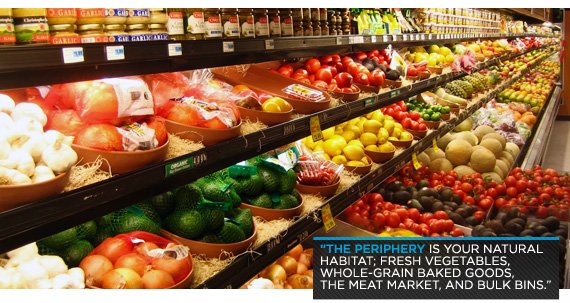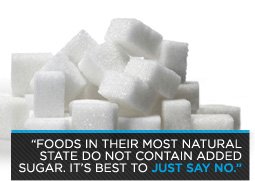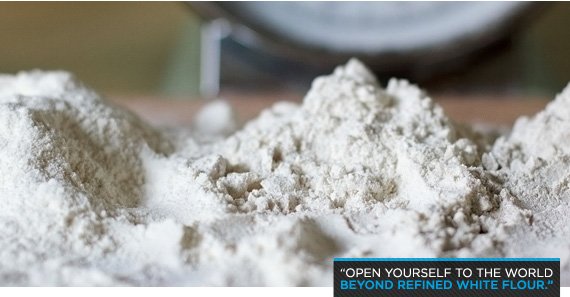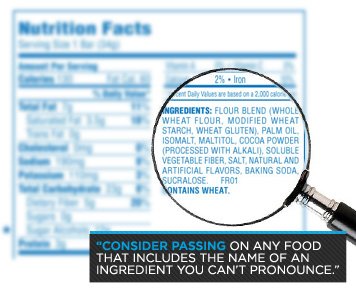Take a good, long look at that fast-food cheeseburger. Every item on it, from the bun to the sauce, was processed in a factory and created in a laboratory. It's packed with enough artificial colors and preservatives to make it look as pretty as a picture.
But does it qualify as "eating clean?" Yeah, right. So what is clean eating? It doesn't refer to washing the nectarine you bought on clearance at the fruit stand—though you should do that, too. It is taking the time to know what your food is made of, and choosing to eat it in its most natural state. Clean eating is about more than just getting lean; it's about making choices that promote optimum long-term health for your body.
Getting clean might just mean tweaking what you're doing now, or it might require you to turn over a whole new leaf. In either case, here are 10 solid rules to keep in mind while you consider the change.
Approach Your Meals As A Lifestyle
Want to get serious? Then forget the D-word entirely. Clean eating is not a fat-loss diet. This is a lifestyle that you're going to sustain from this day forward.
You don't need to get obsessive or throw out everything you love. You're allowed to enjoy your food—you'll need to, if you want to be able to stick with this. So consider yourself warned: You might have to take this as your push to (finally!) learn how to cook for yourself.
What's the other choice—leaving it up to the world to feed you? Forget it. Take control of your life, because once you fall off your clean-eating plan, you'll revert back to feeling low in energy, hungry, and irritable multiple times every day.
Load Up On Fresh Produce
No matter if you're a carb-cutter, carb-loader, paleo warrior, or intermittent faster, your golden rule of clean eating should be to include as much fresh produce in your daily diet as possible.
Vegetables make every dietary system better and healthier. They provide the vitamins and nutrients to keep you feeling as good as you look, and the soluble fiber to make sure you suck every last bit of nutrition out of everything else you eat.
Think you can get all that from a simple greens supplement? You can try, but more than likely, you'll find yourself using this expensive supp as an excuse to cheat when you get hungry later on. So get familiar with the best-tasting in-season fruits and vegetables (and the frozen ones in a pinch), and become a master of seasons and spices. Read recipes like they're great literature and you're on your way.

Shop The Perimeter Of The Grocery Store
Every store is different, but as a general rule, the periphery is the natural habitat of the fresh vegetable, meat market, whole-grain baked goods, and the nuts and dried fruits in the bulk bin. Get comfortable here; it is now your territory.
You'll probably have to venture into the interior for some staples like olive oil, but keep your blinders on. You're entering a museum of extravagant packaging and manipulative slogans. Few of the items you see in the store's interior promote good health; it's a stretch to call most of it "food."
The perimeter is also usually the home of the dairy case and the beer and wine display, so stay strong. Of course, if these are your biggest offenses, you could do a lot worse.

Eliminate Added Sugars
Generally speaking, eating right isn't about avoiding anything in particular. It's about choosing simple, unrefined things and enjoying them. But if you feel more comfortable having an enemy, then fine: Declare war on sugar.

Foods in their most natural state do not contain added sugar—that's why it's called "added sugar." Fruit can still be your friend, but in the case of sweeteners that have been mixed into your food during the manufacturing process, it's best to just say no.
This can be a tough rule to master for some people—probably the toughest—but the day will come when the cravings don't come any more. After that day, a candy bar will taste like what it is: A painfully sweet and unsatisfying pile of mystery ingredients. Try one, and you'll find your energy level crashing and hunger level soaring, just like in the old days.

Drink More Water
You probably got your fill of being commanded to "drink 8-10 glasses of water each day" years ago. Still, the benefits are real—especially if you're in training. Hydrated muscles grow and perform at a higher level, and they are better protected against catabolism (breakdown) than muscles that are a quart low.
"But all that water!" you say. If you really can't take it, then it's time to start experimenting—just try to keep it clear. Drinking herbal teas or green tea can help you naturally cleanse, aside from many other benefits. Flavoring water with lemon or other flavors, or mixing in sugar-free electrolytes or aminos, could also make for healthy sipping during a long work day.
Notice I didn't mention that swimming pool of flavored coffee you drink every day. Black coffee has its place, but there's a point where it crashes into "clean eating," like a speeding cement truck full of sugar and cream.
Sit Down
Part of making healthy eating your lifestyle is setting aside the time to do it right. This means sitting down to a meal whenever possible, preferably at a table, with the people you care about.

If you've been living alone in an apartment for the last five years, this may sound like a giant pain in the neck. But just try it: Invite your friends over for dinner, sit around, and have a conversation. You'll find that it helps you to actually get excited about what you're cooking or serving. Like an athletic competition, it helps you raise your personal training to the next level. The same can't be said for scarfing down pre-fab junk food on the couch or in the car.
Even if you're not sharing your table with anyone in particular, try to clear out a dedicated space in your schedule—and in your stuff—for eating, particularly breakfast and dinner. These are important rituals that you'll be doing for the rest of your life, so the better you are at them, the more you'll enjoy them.
Balance Your Diet
Two of the central ideas behind clean eating are balance and moderation. Don't avoid carbs or dietary fats entirely on your clean diet approach, or you'll find yourself dreading your meals. Get them in, adjusting the portion sizes to fit your particular nutrient and body goals.
Depending on your dietary system or lack thereof, your macronutrient ratio could break down any number of ways. Favor complex, unprocessed carbs and unsaturated fats, and you're on the right track. Your grandmother was right: There's nothing like sitting down to a plate with a protein, a vegetable, and a carb source all arrayed on the plate.
When it comes down to it, the key is to be mindful of your food and what it's made of. If you don't know, that's a problem. You're putting this stuff in your body, after all!
Use Smart Flour Substitutes
Yes, you can enjoy baked goods and eat clean at the same time. The secret is to open yourself to the world beyond refined white flour. This might require that you try out some new recipes and make a few mistakes, but that's all part of the fun, right? Stick with me here.

Almond flour, coconut flour, brown rice flour, and oat flour are all excellent ways to reduce the simple carbs of any recipe and still create delicious treats. Try baking with new flavors like pumpkin, dried fruits, or even savory breads and muffins flavored with meat, garlic, or chives.
Different flours have different nutritional profiles, so make sure to read up on them to find the ones that are best suited to your dietary approach. There's a nearly unlimited variety to choose from.
Don't Eat Foods With Ingredients You Can't Pronounce

Once you've been eating clean for a little while, you'll inevitably begin to see the food industry as the giant machine that it is. It's so much bigger than you, and it has its hands in so many different pockets, that it's impossible for it to have your best interests at heart.
Need evidence? Look at the label of a box of cookies, a children's lunch pack, or even a bottle of "natural" juice. You'd need a chemistry degree to read it, and even then, you couldn't say what those substances are doing to you in the long run.
A good general rule: If you can't state the name of a particular ingredient in the food you're about to dine on, then consider passing. If you're afraid that this rules out your favorite Ethiopian restaurant, consider making an exception for good, simple ethnic foods. Many times, these will pass the "the fewer ingredients the better" test while still giving you the culinary adventure you desire.
Focus On Nutrients, Not Just Calories
Last but not least, as you launch your clean-eating plan, don't get too caught up in the numbers game. In our bodyweight-conscious world, it's easy to measure everything in terms of calories-in, calories-out. While this approach can help make you thin, it's not enough to make you healthy.
The calorie-counting diet guru of the 70s and 80s is a relic of the past. Today, we know that getting the proper nutrients is far more important to an overall health than simple caloric balance.
Think of it this way: One approach leaves you feeling grumpy, ravenous, and guilty about simple pleasures. The other leads you to more energy, stable blood sugar, and a world of new foods you never considered in the past. The choice is easy.
